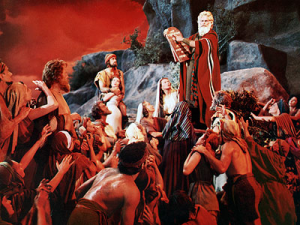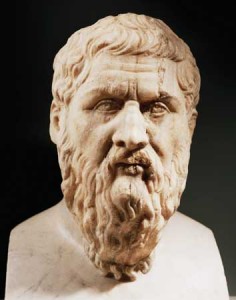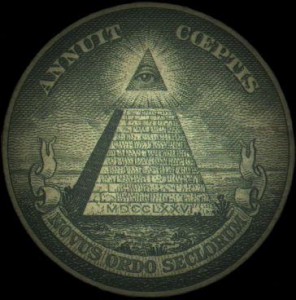We all have visions. They are the silent shapers of our thoughts.
—Thomas Sowell, A Conflict of Visions (1987)
What Moses brought down from Mt. Sinai were not the Ten Suggestions. They are commandments.
—Ted Koppel, an address at Duke University (1987)
Constrained and Unconstrained
In A Conflict of Visions, economist Thomas Sowell shows us how political choices stem from social vision. “A vision is our sense of how the world works,” he writes. “Visions are the foundations on which theories are built.” Sowell concentrates our attention on the two competing visions that dominate America’s political life. He calls them the “constrained vision” and the “unconstrained vision.” The constraint has to do with human nature. What exactly are man’s capacities and limitations? What is his moral and mental nature? How free and how perfectible is he? 
Those who hold the constrained vision see human nature as morally flawed and intellectually limited. They assume that men make immoral, self-centered choices as a matter of course. They believe that men never have enough knowledge to see the end from the beginning. They believe that these constraints put severe limits on human judgment, whether that judgment springs from a society as a whole or whether it springs from the active reason of an individual. But those who have a constrained view of human nature are more likely to trust the judgment of society, especially as it is expressed in the laws, traditions, social habits, and language of the society. They have more confidence in the collective wisdom of the past than in the cutting-edge innovations of even the brightest contemporary thinkers. They are more inclined to hold on to what has been—or what once was—than to change for change’s sake. But they do believe in change—slow, organic change. Those who hold the constrained vision we call Conservatives.
Those moved by an unconstrained view of human nature believe that man is fundamentally good, or nearly so. They see no practical limits to his ability to understand himself and his world. In fact, they see human reason as the obvious arbiter of truth. The more facts, principles, and science available to the reasonable man, the better decisions he will render. In principle, then, society’s wisest and best should be able to make the right choices about pretty much anything. This was Plato’s vision. Once the wisest and the best have delivered their decisions, there is no practical reason those decisions shouldn’t be implemented.  Any changes that might be involved are for the good of humanity, after all. Only the ignorant and the malignant could object. However, the changes must come, and if some vagueness, even some blatant deceit, is required to effect the changes in question, still the changes must go through. The worthiness of the goal outweighs the shoddiness of the process. The debt ceiling debate is a perfect example. Utopia is worth the price. Those who hold this unconstrained vision we call Liberals.
Any changes that might be involved are for the good of humanity, after all. Only the ignorant and the malignant could object. However, the changes must come, and if some vagueness, even some blatant deceit, is required to effect the changes in question, still the changes must go through. The worthiness of the goal outweighs the shoddiness of the process. The debt ceiling debate is a perfect example. Utopia is worth the price. Those who hold this unconstrained vision we call Liberals.
The goal of this essay and its sequel is to compare each of these visions with God’s vision for society as it is revealed in the Law that God spoke from Sinai, the Ten Commandments (Ex. 20). First, we’ll consider the unconstrained or liberal vision, if only because the comparison is simpler. Next time, we will return to the constrained vision. That being said, here’s my take on how liberals (the unconstrained view) interact with the Ten Commandments:
1: No Other Gods
The Law says we must have no god but the God of the Bible. But for the unconstrained vision, the God of the Bible is an impossibility. If such a God existed, then man’s reason would be limited by God’s omniscient wisdom and man’s freedom limited by His divine sovereignty and moral authority. The existence of such a God would reduce man to a mockery, a thing created merely for someone else’s pleasure—a cosmic version of midget wrestling. The matter is too preposterous and irrational to debate. Liberals insist we look to human reason incarnate in the technocratic State for ultimacy, so again, we must look to the wisest and best in our society. Our philosopher-kings and our Keynesian magicians will save us.
2: No Graven Images
 The Law forbids the making and worshiping of idols. To a point, the unconstrained vision agrees. We should have no graven images. But here’s why Liberals might tend to go along with this one—graven images smack of ancient things long past, of ideals set in stone, of musty lore and fantastic traditions. No permanent images, thank you. Nothing indelible. But big picture HD images… fast fading web images… here today and forgotten tomorrow images… these are effective tools for the emotional moment and commit us to believing in nothing. The wisest and best—and their network oracles—love to thrill and move us with the latest flashes of light and shadow, but they never commit us to anything except a vague longing for a movie’s sequel.
The Law forbids the making and worshiping of idols. To a point, the unconstrained vision agrees. We should have no graven images. But here’s why Liberals might tend to go along with this one—graven images smack of ancient things long past, of ideals set in stone, of musty lore and fantastic traditions. No permanent images, thank you. Nothing indelible. But big picture HD images… fast fading web images… here today and forgotten tomorrow images… these are effective tools for the emotional moment and commit us to believing in nothing. The wisest and best—and their network oracles—love to thrill and move us with the latest flashes of light and shadow, but they never commit us to anything except a vague longing for a movie’s sequel.
3: Honor God’s Name
The Law tells us to use God’s name rightly. We take up God’s name when we swear an oath. For the unconstrained vision, oaths represent a power that binds us to a past perspective, a perspective that may be totally outdated today or tomorrow. Such a thing is unacceptable. Liberals insist we be true to ourselves as we understand ourselves only at this moment. Commitment by oath is at odds with such true autonomy. Sowell uses the novelist and philosopher William Godwin to underscore the way the unconstrained vision deals with commitment. Godwin was the husband of feminist Mary Wollstonecraft and the father of Mary Godwin Shelley, the creator of Frankenstein. He hated commitment, whether by oath or even through loyalty and gratitude. He insisted on man’s freedom to act on the latest information. For example, Godwin writes in An Enquiry Concerning Political Justice (1793):
Am I precluded from better information for the whole course of my life? And, if not for my whole life, why for a year, a week, or even an hour?
Liberals believe commitments shut up a man’s mind against new information and cripple his ability to act rationally. They insist permanent commitments are death to self, death to personal autonomy.
4: Remember the Sabbath Day
The Law requires us to honor the Sabbath Day. The Jewish Sabbath commemorated the original creation week. The New Testament Lord’s Day commemorates Christ’s resurrection from the dead. The unconstrained vision can make no pact with such mysticism. It would be utterly irrational to commemorate a past event even if it anchored all history. Liberals ask: should we let the memory of one pseudo-historical event shape our ethic of work and leisure, let alone our culture? Certainly not. Perhaps we need a cycle of work and rest, but its proper goal would be to make me more efficient or to better the species. We can consult the experts. They always know what to do.
 5: Honor Your Parents
5: Honor Your Parents
The Law requires us to honor our parents. For the unconstrained vision, parents are the voice of the dead past. They are the ignorance, superstition, and bigotry of an earlier time. Liberals believe children will see more clearly than their parents and ancestors. Logically then, parents have no rights in, or claims upon, their kids. They birth them and raise them for the village or the super state. Any attempt on the parents’ part to assert their authority or to impose any sort of vision upon their children would be the worst sort of meddling, as well as a positive threat to society. Homeschooling and Christian education, of course, are the ultimate evil.
6: Don’t Kill
The Law says, “Don’t kill.” Jesus rendered this, “Thou shalt do no murder.” In principle, the unconstrained vision agrees. They say there is nothing more important than human life. Well, kind of. Liberals believe that, in the long run, human life must be preserved for some. But they say revolutions are necessary, even if they’re primarily ideological. To prove this, they hang Chairman Mao Christmas ornaments up on their winter solstice trees. You have to break some eggs to make an omelet they say. The wisest and best tell us that some lives must be lost now so that all can be saved later. Liberals also tell us with great certainty who counts as human and who doesn’t. They’re the wisest and the best after all.
7: Don’t Commit Adultery
The Law requires fidelity to one’s spouse. The unconstrained vision values autonomy more than enduring love. Past commitments must give way to the needs of the moment. If the sincerity of my love has failed, if my present needs mandate a rearrangement of marital or sexual relationships, then I must be true to myself. It’s rational that I meet my needs. It really is that simple.
8: Don’t Steal
The Law requires us to respect the property of others. But for the unconstrained vision, inequality of property is one of the chief injustices in our world. If we are to have true social justice and practical equality, then a proper redistribution of wealth is necessary. Remember what the man said to the plumber: “We’ve got to spread the wealth around a little.” We (collectively) must take from those who have far too much and give to those who have far too little. The excessive property of the rich is itself a form of theft unless the rich are your friends, of course. This is true where individuals are concerned and it’s also true of nations. The rich must repay the poor. They call this social justice.
9: Don’t Bear False Witness
The Law demands faithful testimony, whether in or out of court. But for the unconstrained vision, it’s the results that matter. Social justice must triumph and love for humanity must carry the day. The end is worth all the means. Whatever pushes us toward the goal is true enough for today. Truth is what works. If you have to lie to get a spending bill passed… the lie is true for you and you push it through.
10: Don’t Covet
The Law demands contentment as well as personal charity. For the unconstrained vision, contentment is a cop-out, and personal charity is too little, too late. Liberals insist we revel in our discontent. The world is not yet fully made in man’s image, so it needs a lot of hard work from all village members to get us there. But the good news is that we can get there if we hope enough and change enough. Or close enough anyway. Just give us political power and lots and lots of funding. We’ll take from the haves, give to the have-nots, keep a little bit, you know, for the effort, and everyone will marvel at how easily Utopia arrived.
Conclusion
The unconstrained vision is the vision of Romanticism and revolution. Its always dawning New World Order is a world of economic socialism, sexual licentiousness, and individual arrogance—and all in the name of love. Liberals think they’re superior because they know the rest of us are all equal. And unless you believe what they believe, you’re labeled an angry hillbilly with a gun. I guess that makes sense. The Ten Commandments however, define love and social harmony in radically different terms. God’s Law, like the Gospel, summons us to love God and die to self, to love our neighbor and leave his stuff alone. The Law requires more than ideals, sincerity, and good intentions… it requires godly action and godly restraint.
For Further Reading:
Thomas Sowell, A Conflict of Visions (New York: William Morrow and Company, 1987).
Dinesh D’Souza, Letters to a Young Conservative (New York: Basic Books, 2002).
Rousas John Rushdoony, The Politics of Guilt and Pity (Nutley, NJ: The Craig Press, 1970).
Rousas J. Rushdoony, The Institutes of Biblical Law (N. p.: Craig Press, 1973).
T. Robert Ingram, The World Under God’s Law, Criminal Aspects of the Welfare State (Houston, TX: St. Thomas Press, 1962).
Gary North, The Sinai Strategy, Economics and the Ten Commandments (Tyler, TX: The Institute for Christian Economics, 1986).
Greg L. Bahnsen, By This Standard, The Authority of God’s Law Today (Tyler, TX: The Institute for Christian Economics, 1985).